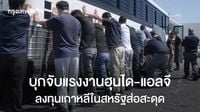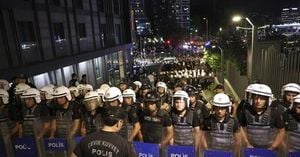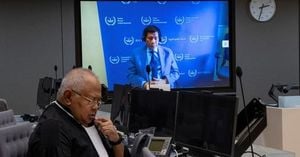On the morning of September 8, 2025, a sweeping immigration enforcement operation unfolded at a Hyundai and LG Energy Solution joint-venture plant near Savannah, Georgia, shaking the foundations of a burgeoning economic partnership between South Korea and the United States. According to multiple reports, including coverage by Bloomberg and Yonhap, U.S. immigration agents descended on the electric vehicle battery manufacturing site, detaining 475 workers—of whom about 300 were Korean nationals—on allegations of immigration violations.
The incident, which quickly became headline news in South Korea, has sparked outrage, diplomatic tensions, and fears for the future of multi-billion-dollar Korean investments in the United States. Images of Korean workers handcuffed at the wrists, waists, and ankles, herded onto buses, circulated widely in Korean media. The country’s largest newspaper, Chosun Ilbo, published photos showing detainees pressed against buses and described the Georgia detention facilities as “full of mold, worse than prison.”
“This feels like being stabbed in the back,” said Professor Kim Tae-hyung, chair of political science at Sungshin University in Seoul, reflecting the mood of many Koreans. “Most Koreans cannot contain their anger,” he added, warning that South Korea’s corporate giants would “inevitably” reconsider their plans to invest further in the United States.
The timing of the raid could hardly have been more sensitive—or more damaging. Just weeks prior, South Korean President Lee Jae-myung had met with former U.S. President Donald Trump at the White House, reaffirming the strength of the alliance and celebrating new trade agreements. Korean firms had pledged to pour hundreds of billions of dollars into the U.S. economy, with a $350 billion fund announced to support Korean businesses expanding stateside and an additional $150 billion in direct investment commitments.
Yet, as Bloomberg reports, the images of detained Korean workers and the ensuing uproar have cast a long shadow over these plans. Business leaders and government officials in Seoul are now openly questioning the safety and viability of Korean investments in the U.S., citing political risks and the unpredictability of American immigration enforcement.
South Korean government officials moved swiftly over the weekend to address the crisis. The presidential office announced preparations to charter a flight to repatriate the detained workers from Folkston, Georgia, after concluding emergency discussions with U.S. authorities. Foreign Minister Cho Hyun was dispatched to Washington to finalize arrangements and ensure a smooth, incident-free release of the Korean nationals. “We are working to bring our citizens home as quickly as possible,” a foreign ministry official told Yonhap, adding that the earliest the charter flight could depart for the U.S. would be September 10.
The legal status of the detained workers remains unclear. Questions swirl around the types of visas they held and whether those documents permitted them to work at the construction site. U.S. immigration authorities reportedly offered two stark options: voluntary repatriation, or deportation with a five-year ban from re-entering the country. The South Korean government has been urging its citizens to opt for voluntary return, warning that forced deportation could jeopardize future travel to the U.S., including stricter visa scrutiny or outright bans.
As of Sunday, South Korean consular officials had met with approximately 250 of the detained workers, according to Yonhap. Negotiations between Seoul and Washington have reportedly focused on ensuring the safe and dignified return of the workers without the stigma and consequences of deportation.
Behind the diplomatic scramble lies a deeper, more persistent tension: the U.S. Congress has been reluctant to expand visa quotas for South Korean workers, despite repeated requests from Seoul. In contrast, countries like Chile, Singapore, and Australia secured expanded visa quotas through free trade agreements in the early 2000s. Rising anti-immigrant sentiment in the U.S. and political gridlock in Washington have left South Korea’s requests unanswered.
The fallout from the raid has rippled through the South Korean political and business communities. Over the weekend, members of the ruling party’s parliamentary group declared that if the U.S. truly wishes to attract Korean investment, it must guarantee the safety of Korean citizens and reform its visa policies for investors and workers. “The mass detention of Koreans should never have happened,” they stated, calling on Seoul to pressure Washington for stronger protections and more transparent immigration rules for those entering the U.S. for business purposes.
For many in South Korea, the incident is more than a bureaucratic mishap—it feels like a betrayal of trust at a critical juncture in bilateral relations. The sense of outrage is palpable, with some business leaders warning that the political risks of investing in the U.S. have become impossible to ignore. The episode, as Professor Kim noted, is “overshadowing” Korea’s multi-billion-dollar investment plans and could prompt a strategic rethink among Korea’s industrial giants.
In the U.S., the operation is being framed as a routine enforcement of immigration law. Yet the scale and publicity of the raid—targeting a high-profile joint venture that symbolizes the growing economic interdependence of the two allies—has raised eyebrows even among American observers. The question lingers: can the U.S. balance its domestic immigration priorities with its ambitions to remain a top destination for foreign investment, especially at a time when global competition for capital and talent is fiercer than ever?
As the dust settles, both governments face tough choices. For Seoul, the priority is the safe return of its citizens and the restoration of trust with a key ally. For Washington, the challenge lies in reassuring foreign investors that the U.S. remains open for business, while upholding the rule of law at home. The outcome of this episode may well shape the future trajectory of U.S.-Korea economic ties—and serve as a cautionary tale for international companies navigating the complex intersection of business, politics, and immigration in a rapidly changing world.
For now, the fate of the 300 Korean workers hangs in the balance, as both nations scramble to contain the fallout and chart a path forward.




